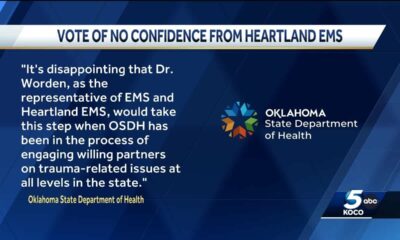Mississippi Today
At least 96 Mississippians died from domestic violence. Bills seek to answer why
At least 96 Mississippians died from domestic violence. Bills seek to answer why
Nearly 100 Mississippians, some of them children, some of them law enforcement, died last year in domestic violence-related events, according to data Mississippi Today collected from multiple sources.
Information was pulled from local news stories, the Gun Violence Archive and Gun Violence Memorial and law enforcement to track locations of incidents, demographics of victims and perpetrators and any available information about court cases tied to the fatalities.
But domestic violence advocates say Mississippi needs more than numbers to save lives.
They are backing a refiled bill to create a statewide board that reviews domestic violence deaths and reveals trends, in hopes of taking preventative steps and making informed policy recommendations to lawmakers.
A pair of bills, House Bill 1551 and Senate Bill 2886, ask the state to establish a Domestic Violence Fatality Review Board. The House bill would place the board in the State Department of Public Health, which oversees similar existing boards that review child and maternal deaths, and the Senate version proposes putting the board under the Department of Public Safety.
“We have to keep people alive, but to do that, we have to have the infrastructure as a system to appropriately respond to these things,” said Stacey Riley, executive director of the Gulf Coast Center for Nonviolence and a board member of the Mississippi Coalition Against Domestic Violence.
“It’s not necessarily just law enforcement, just medical, just this,” she said. “It’s a collaborative response to this to make sure that the system has everything it needs.”
Mississippi is one of several states that do not have a domestic violence fatality review board, according to the National Domestic Violence Fatality Review Initiative.
Without one, advocates say it is impossible to know how many domestic fatalities and injuries there are in the state in any year.
Riley said data can tell the story of each person affected by domestic violence and how dangerous it can be. Her hope is that a fatality review board can lead to systemic change in how the system helps victims and survivors.
Last year, Mississippi Today began to track domestic violence fatalities similar to the way the board would be tasked to do. It found over 80 incidents in 2024 that resulted in at least 100 deaths.
Most of the victims were women killed by current and former partners, including Shaterica Bell, a mother of four allegedly shot by Donald Demario Patrick, the father of her child, in the Delta at the beginning of that year. She was found dead at the home with her infant. One of her older children went to a neighbor, who called 911.
Just before Thanksgiving on the Coast, Christopher Antoine Davis allegedly shot and killed his wife, Elena Davis, who had recently filed a protection order against him. She faced threats from him and was staying at another residence, where her husband allegedly killed her and Koritnik Graves.
The proposed fatality review board would have access to information that can help them see where interventions could have been made and opportunities for prevention, Riley said.
The board could look at whether a victim had any domestic abuse protection orders, law enforcement calls to a location, medical and mental health records, court documents and prison records on parole and probation.
In 2024, perpetrators were mostly men, which is in line with national statistics and trends about intimate partner violence.
Over a dozen perpetrators took their own lives, and at least two children – a toddler and a teenager – were killed during domestic incidents in 2024, according to Mississippi Today’s review.
Some of the fatalities were family violence, with victims dying after domestic interactions with children, parents, grandparents, siblings, uncles or cousins.
Most of the compiled deaths involved a firearm. Research has shown that more than half of all intimate partner homicides involve a firearm.
A fatality review board is meant to be multidisciplinary with members appointed by the state health officer, including members who are survivors of domestic violence and a representative from a domestic violence shelter program, according to the House bill.
Other members would include: a health and mental health professionals, a social worker, law enforcement and members of the criminal justice system – from prosecutors and judges to appointees from the Department of Public Safety and the attorney general’s office.
The House bill did not make it out of the Judiciary B Committee last year. This session’s House bill was filed by the original author, Rep. Fabian Nelson, D-Byram, and the Senate version was filed by Sen. Brice Wiggins, R-Pascagoula.
The Senate bill was approved by the Judiciary A Committee Thursday and will proceed to the full chamber. The House bill needs approval by the Public Health and Human Services Committee by Feb. 4.

“The idea behind this is to get at the root cause or at least to study, to look at what is leading to our domestic violence situation in the state,” Wiggins said during the Judiciary A meeting.
Luis Montgomery, a public policy and compliance specialist with the Mississippi Coalition Against Domestic Violence, has been part of drafting the House bill and is working with lawmakers as both bills go through the legislative process.
He said having state-specific, centralized data can help uncover trends that could lead to opportunities to pass policies to help victims and survivors, obtain resources from the state, educate the public and see impacts on how the judicial system handles domestic violence cases.
“It’s going to force people to have conversations they should have been having,” Montgomery said.
This article first appeared on Mississippi Today and is republished here under a Creative Commons license.![]()
Mississippi Today
Mississippi lawmakers keep mobile sports betting alive, but it faces roadblock in the Senate

A panel of House lawmakers kept alive the effort to legalize mobile sports betting in Mississippi, but the bill does not appear to have enough support in the Senate to pass.
Hours before a Tuesday evening legislative deadline, the House Gaming Committee inserted into two Senate bills the language from a measure the full House passed last month to permit online betting. The legislation would put Mississippi on track to join a growing number of states that allow online sports wagering.
But the House Gaming Committee had to resort to the procedural move after its Senate counterpart declined to take up its bill. Senate Gaming Chairman David Blount, a Democrat from Jackson, said he does not support the measure, prompting frustration from House Gaming Chairman Casey Eure, a Republican from Saucier. Eure said he implemented suggested changes from the Senate after lawmakers couldn’t agree on a final proposal in 2024.
“This shows how serious we are about mobile sports betting,” Eure said. “I’ve done everything he’s asked for … I’ve done everything they’ve asked for plus some.”
In a February 88-10 vote, the House approved a new version of the Mississippi Mobile Sports Wagering Act, which Eure said was reworked to address concerns raised by the Senate last year. The new version would allow a casino to partner with two sports betting platforms rather than one. Allowing casinos to partner with an extra platform is designed to assuage the concerns of casino leaders and lawmakers who represent areas where gambling is big business.
Last year, some lawmakers raised concerns that gambling platforms would have no incentive to partner with smaller casinos, and most of the money would instead flow to the Mississippi Gulf Coast’s already bustling larger casinos.
Other changes include a provision that prevents people from placing bets with credit cards, a request from the Senate to guard against gambling addiction.
Blount said there were growing concerns in other states that have legalized online sports betting, including over what consumer protections can be put in place and the impact legalization could have on existing gambling markets.
“This is a different industry than any other industry because it is subject to forces outside of the control of the folks who are on this business,” Blount said. “And so what I think we need to do as a state, and we have done this for decades, is we have provided a stable regulatory environment, regardless of who is in the legislature, regardless of who the governor is, without a lot of drama.”
The proposal would levy a 12% tax on sports wagers, with revenue reaching all 82 counties via the Emergency Road and Bridge Repair Fund. Eure said he believes the state is losing between $40 million and $80 million a year in tax revenue by keeping mobile sports betting illegal.
Proponents also say legalization would undercut the influence of illicit offshore sports betting platforms.
Since the start of the NFL season this year, Mississippi has recorded 8.69 million attempts to access legal mobile sportsbooks, according to materials presented to House members at an earlier committee meeting. That demand fuels a thriving illegal online gambling market in Mississippi, proponents have said. Opponents say legalization could devastate the bottom line of smaller casinos and lead to debt and addiction among gamblers.
Mobile sports betting is legal in 30 states and Washington, D.C., according to the American Gaming Association.
The House panel inserted the mobile sports betting language into SB 2381 and SB 2510. The bills now head to the full chamber for consideration.
This article first appeared on Mississippi Today and is republished here under a Creative Commons license.![]()
Mississippi Today
Key lawmaker reverses course, passes bill to give poor women earlier prenatal care

A bill to help poor women access prenatal care passed a committee deadline at the eleventh hour after a committee chairman said he wouldn’t bring it up for a vote.
The policy was signed into law last year, but never went into effect because of administrative hiccups.
Last week, Senate Medicaid Chair Kevin Blackwell, R-Southaven, told Mississippi Today that he would not be taking up the House’s bill to fix the issues in the program, calling it “his prerogative as chairman.”
However, on deadline day, Blackwell called the bill up in his committee. It passed unanimously and without discussion. It will now move on to the floor vote in the Senate, where it passed with overwhelming support last year.
Blackwell declined to comment on why he changed course.
Blackwell had previously added the policy to another Medicaid bill, but was criticized by House Medicaid Chair Missy McGee, R-Hattiesburg, for attaching her legislation to what she called a “$7 million laundry list of unrelated lobbyist requests.”
In addition, the policy in Blackwell’s tech bill included language that the Centers for Medicaid and Medicare Services – the agency charged with overseeing state Medicaid programs – denied last year.
Presumptive eligibility for pregnant women allows low-income women who become newly eligible for Medicaid once pregnant to receive immediate coverage as soon as they find out they’re pregnant – even if their Medicaid application is still pending. The program is especially effective in states that have not expanded Medicaid.
Mississippi is currently one of only three states with neither expansion or presumptive eligibility for pregnant women.
An expectant mother would need to fall under the following income levels to qualify for presumptive eligibility in 2025:

This article first appeared on Mississippi Today and is republished here under a Creative Commons license.![]()
Mississippi Today
Health Department backtracks on plans for child care regulation revisions

After weeks of often contentious back-and-forth with child care providers, the Mississippi Department of Health is walking back its revised regulations for the industry.
External affairs and media relations director Greg Flynn confirmed the news, explaining that MSDH is still working on the proposed changes, and that they will not present them in the near future. “The topic will not be presented at the Board of Health meeting in April,” he stated.
Nicole Barnes, director of the Child Care Licensure Bureau, stated that, “Once the edits have been finalized, we will plan to share those accordingly with the child care advisory council.”
According to an MSDH spokesperson, MSDH leadership retracted the revisions on Feb. 28. It’s the same day the Division of Early Childhood Care & Development’s Child Care Payment Program Advisory Council was supposed to hold an ad hoc meeting going over the revisions. The meeting was cancelled after the announcement.
This update comes after months of upset among child care providers over revisions. Initially, MSDH filed to revise child care regulations last November. Child care providers criticized the revisions for being too restrictive and impractical. They also criticized the licensing agency for its rollout of the revisions.
MSDH said these changes were necessary to follow the Child Care and Development Fund Block Grant Act’s health and safety requirements. They did not initially consult the Child Care Advisory Council or the Small Business Regulatory Committee.
The agency maintained that it followed Mississippi Administrative Procedures Act. However, some child care providers said they violated state law by not notifying them of the proposed changes within three days of filing them, as well as being generally inconsiderate of providers’ needs.
“We are all committed to providing high-quality care for children in the state of Mississippi and want to partner with the Health Department to ensure their health and safety is our first priority,” said Lesia Daniel, owner of Funtime in Clinton and member of the advisory council.
Roberta Avila, a member of the Child Care Advisory Council, said there needs to be more transparency and consideration for providers during revision changes. “As a member of the Council I want to work in cooperation with the agency,” she said. “I hope we can start anew with the agency to ensure that all licensed providers, who will be affected by any changes in the regs, are informed about the process and will have an opportunity to give timely input to the agency.”
This article first appeared on Mississippi Today and is republished here under a Creative Commons license.![]()
-

 News from the South - Virginia News Feed5 days ago
News from the South - Virginia News Feed5 days agoVirginia woman getting ready to celebrate 100th birthday: 'I have really enjoyed life'
-

 Mississippi Today6 days ago
Mississippi Today6 days agoSenate passes redistricting that puts DeSoto Republican, Tunica Democrat in same district, calls for 10 new elections
-

 News from the South - Florida News Feed3 days ago
News from the South - Florida News Feed3 days ago4 killed, 1 hurt in crash after car attempts to overtake another in Orange County, troopers say
-

 News from the South - Virginia News Feed4 days ago
News from the South - Virginia News Feed4 days agoStorm chances Wednesday, rollercoaster temperatures this weekend
-

 Mississippi Today5 days ago
Mississippi Today5 days agoMississippi private prison OK’d to hold more ICE detainees
-

 News from the South - Oklahoma News Feed4 days ago
News from the South - Oklahoma News Feed4 days agoOklahoma Department State Department of Health hit with no confidence vote
-

 Mississippi Today3 days ago
Mississippi Today3 days agoJudge’s ruling gives Legislature permission to meet behind closed doors
-

 News from the South - Georgia News Feed7 days ago
News from the South - Georgia News Feed7 days agoI-Team: Covington lawyer faces Bar complains














































